'What proportion of the people require the vaccine for us to manage this entire COVID-19 situation?'
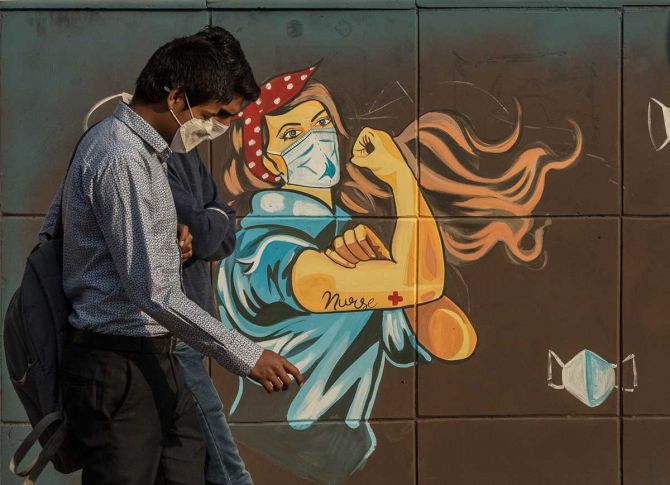
The COVID-19 vaccine is coming to India.
But, already, as per a recent survey, conducted by a health products company**, 53 per cent Indians have concerns about taking the vaccine.
Possibly, their worries are unfounded.
Possibly, we are not being appreciative enough of the magical marvels of modern medicine that has made The Vaccine possible.
Reports on many of the vaccines in the pipeline, or already in trial circulation, declare these brand-new vaccines, developed against all odds, miraculously quickly, against this awful COVID-19 scourge, to be mostly safe and successful.
Physician and public health specialist, Bengaluru-based Dr Giridhar Babu emphaises this, telling Vaihayasi Pande Daniel/Rediff.com in Part II of his interview: "The data is really robust in terms of how effective the vaccines are. Whichever vaccine they have (cleared) for use, they have proved beyond any reasonable doubt."
Worries apart: Will you and I, who are not senior citizens or healthcare workers or nursing comorbidities, even have the option of taking the COVID-19 vaccine?
Dr Giridhar, a professor and head lifecourse epidemiology at the Public Health Foundation of India, Bengaluru, with many years of experience with vaccine programmes, explains why there is a possibility that the healthy and young may not receive The Vaccine.
Do we have anything to learn from anywhere else in the world, when it comes to vaccine programmes before we embark on a COVID-19 vaccination drive?
Or can the world learn from us?
India has been a leader in vaccine implementation.
For example, many people said India will be the last country to do polio eradication.
Not only was it an earlier among the lower-income countries to eradicate polio.
But also, the Indian model, in terms of having the monovalent* vaccine for polio, was a purely indigenous contribution.
That same model is now employed elsewhere in the world.
Our surveillance*** for polio has been truly world class.
And most of the people who are trained in India as Surveillance Medical Officers from the WHO have gone to leadership positions all over the world.
There is an immense amount of learning, when it comes to immunisation programmes, on how India does it and how others can implement.
Also, in managing the adverse effects of a vaccine and working with the media in terms of reporting adverse events.
Vaccine hesitancy in receivers of the vaccine is a major problem in the UK, US and elsewhere.
But not in India, because the communication has been crystal clear.
Also, in terms of managing adverse events, there is a dedicated system for adverse events.
I have no worries about how the vaccine rollout will happen in India.
All I am praying is that we should get a vaccine in a large scale as soon as possible.
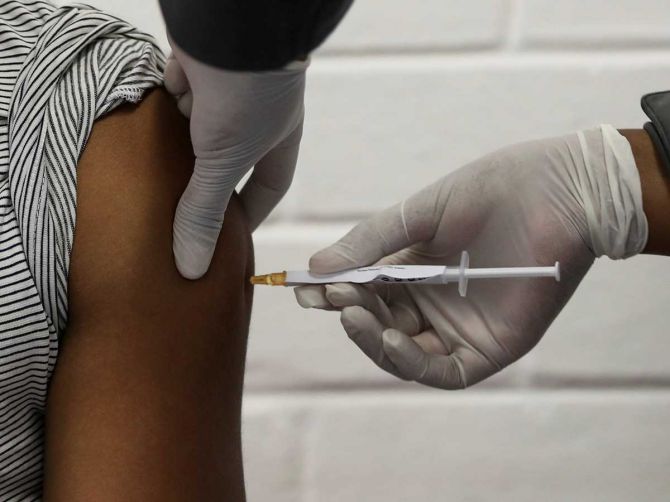
One has been reading about all the different kinds of vaccines being developed, with Pfizer taking the lead.
It seems sort of like a Christmas wish kind of situation: India is choosing from its own indigenous projects, as well as from what's on offer all over the world.
Is there anything else India should look out for, before we decide which vaccine will work for us, apart from affordability and temperature?
Although not by design, I have a feeling that the situation for India has actually been an advantageous one.
Most of the vaccines that have been permitted, either in the UK or the US, are under emergency use authorisation.
They have not been given full approval.
Full approval will be given when the trials are complete.
So, these mass vaccination programs in UK and US, actually give India an opportunity to examine how these vaccines are getting rolled out.
For example, in the UK, allergic reactions were reported, imagine after the vaccination was started.
So, then course corrections were done.
All these learnings India can do by looking at others, even before a decision is made (on what vaccine to choose).
The good thing is, India has not made a promise to any one company saying that: 'I'll buy from you'.
They have kept their options open and a decision will be based on all these feasibility options.
Once you have the learnings from everyone, and then you study your own assessment, in terms of suitability and all that, then India can go ahead
In a few months India will start its programme of vaccination.
But before that, it can also look at the results from other countries which are actually doing vaccination.
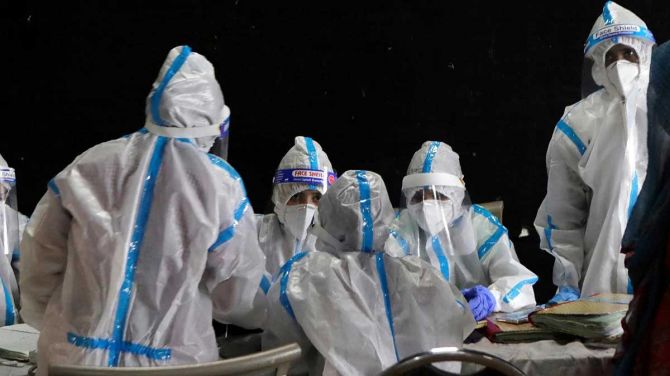
Now that the vaccine is available, there's talk about whether one should take it or not when it arrives.
First, of course, it will go to frontline workers and the most vulnerable.
But what are the factors that should colour one's decision about stepping forward and taking it?
I know so many people who don't want to take it?
Please give me reasons why they should be persuaded to take it.
Whichever vaccine they have (cleared) for use, they have proved beyond any reasonable doubt (its safety and efficacy).
So, there is no problem there, because the data is really robust in terms of how effective the vaccines are.
Even the mRNA**** vaccines are proven with certification.
The question then is: Will I get it now or not?
Obviously, the answer is no.
You need to go methodically.
In the US, they will first vaccinate people who are in the long-term care and healthcare workers. And in the UK it is for the healthcare workers and the elderly, in the way they have planned it.
And once that is done, at least you have prevented major mortality patterns, that we're seeing now.
Then, when the time comes, there are others.
If they need the vaccine, they should take it.
Should a country have a universal vaccination programme?
I don't think there is enough evidence out there that says everybody needs the vaccine.
Everybody can take the vaccine because the vaccine is anyway popular and going to be beneficial.
But the question is, what proportion of the people require the vaccine for us to manage this entire COVID-19 situation and other big outbreaks or pandemics.
That the different countries and international organisations have to answer.
Currently the verdict is not out on whether:
-Universal vaccination is the way.
-Or if immunising all the high-risk people is sufficient.
-Or let's do universal vaccination in a phase-wise manner.
All these decisions require consultation and will be made based on evidence.
So it's not even basically in my hands to decide if I would like to have the vaccine?
That will be decided for me, basically?
I think what is going to happen -- at least for those who can afford it and when you have more than one vaccine -- they will be available in the private market.
I don't know whether that's the policy India will take -- whether they will allow private manufacturers to sell over the counter or sell through the private sector.
If they do that, then there are people who will be able to afford it and take it.
But that depends on an individual's liquidity.
There will be people who don't have money and will feel: 'I don't have, so therefore I can't get protected'.
The government has to balance this.
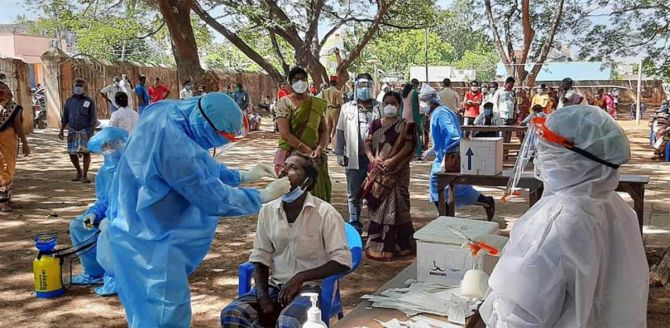
Is a structured communication approach required to make sure, for instance, that rural people buy into it the idea of being vaccinated against COVID-19?
In rural areas -- it is reported, and I have seen this first-hand -- there are still many who have not understood the dangers of COVID-19 yet or the importance of wearing a mask.
Many have no clue about COVID-19. They feel that if they have some concoction of lemon juice daily, they will never get it and that they don't need to wear masks.
The same kind of ignorance may be the approach to vaccination too?
There are many types of extremes in the way people behave.
In one extreme, you have those who have COVID-19 fatigue.
They have followed all the rules so far, but now they have given up.
In the other extreme you have people who feel: 'It will not affect me, so I can do whatever I want'.
The communication programme will have to encompass all extremes.
The Government of India has launched a specific communication programme just to address all this.
But the more platforms the merrier.
Only the government doing communication would not be sufficient.
That's where the media, such as your engagement with the public, how do you perceive this and how you address it, that is important.
Also, other thought leaders, and people who are role models, how they behave and how they will influence -- all these things matter.
From your experience, what do people not understand about the arrival of the vaccine.
It could be anybody you have interacted with, maybe people in the media or even doctors.
What do people not understand about a vaccination programme?
Especially in the context of COVID-19?
I think the good thing about not understanding right now, is that there is also not much of misinformation in India, regarding vaccines.
The moment you start believing all these WhatsApp University stories, then there is also a problem for vaccine roll out.
So, the way government is operating now -- nobody has really noticed -- but for the last one -and-a-half months, there has been training, planning, district- and state-level meetings, discusions on how to strengthen the cold chain and then on communication.
How do you then communicate it to people?
Who should be communicated to?
How they should be enrolled?
All this is being well thought out.
I think that's a way to go forward.
The important (aspect) I feel is, that we should not be too hopeful of the vaccine and not follow any of the other public health regulations.
That is one danger.
The other danger is, which we don't see in India, but we see elsewhere, is about vaccine hesitancy.
So, you have to carefully tread a path in between, while promoting the vaccine for those who need it and promoting the public health behavior among the others.
When I last interviewed you, it was April.
I would like to know what has been the greatest learning in these intervening months with respect to this disease, for you, when you think back on it?
My learning from the disease is that, it has been the most humbling experience.
If you're not updated, then you're outdated.
You have to read every day in terms of understanding how the immune mechanism works and the operational variants of the vaccine.
Then today or tomorrow, a new press release comes in, and then you find the data.
So, it is a very humbling experience, where you have to catch up to the pace of how this virus is having a devastating effect.
But at the same time the kind of collaborations I have developed within India -- with people who've I never met, with people with whom I thought I'll never do collaborations, one physicist, one biologist, one modeller and we are working for the same cause.
This is phenomenal.
So, there have been a lot of learning from the management for this pandemic.
My only hope is these collaborations continue.
And we don't lose sight of our pandemic preparedness.
It should not be a situation of just tiding over the crisis and then forgetting about it.
** GOQii
***According to Haffkine.com: 'Monovalent Type 1 Oral Poliomyelitis vaccine (mOPV1)is administered to stimulate the body mechanism to produce active immunity by simulating the natural infection without producing untoward symptoms of the disease.
This is achieved by multiplication of the vaccine virus in the intestinal tract'.
**** According to a WHO report: 'Poliomyelitis surveillance in India previously involved passive reporting of clinically suspected cases.
The capacity for detecting the disease was limited because there was no surveillance of acute flaccid paralysis or AFP'.
But that all changed in October 1997 when '59 specially-trained Surveillance Medical Officers were deployed throughout the country to establish active AFP surveillance; 11,533 units were created to report weekly on the occurrence of AFP cases at the district, state and national levels; timely case investigation and the collection of stool specimens from AFP cases was undertaken and linkages were made to support the polio laboratory network'.
*Kindly note the images have been posted only for representational purposes.
Feature Presentation: Ashish Narsale/ Rediff.com
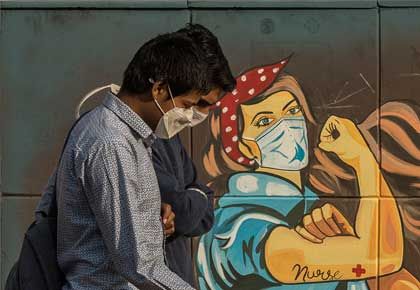











 © 2025
© 2025